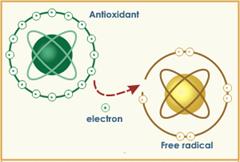CoQ10 is the fundamental ingredient for energy production in every cell
CoQ10 IGNITES the spark for energy production in the cell mitochondria (the energy production "factories"inside our cells). CoQ10 shuttles electrons (extracted from food) back and forth between enzymes in the cell mitochondria in the process of making ATP molecules (the cells energy "currency").
Without adequate amounts of CoQ10, the heart does not have enough energy to pump the blood efficiently. The heart has the highest concentration of CoQ10. It has been reported that death can occur if the CoQ10 level in the heart decreases below 75% of normal.
In more detail
CoQ10 is a crucial component of the electron transport chain (respiratory chain) in the mitochondria where energy derived by a process called oxidative phosphorylation from the products of fatty acid, protein and carbohydrate metabolism is converted into biological energy called adenosine triphosphate (ATP) that drives cellular machinery and all biosynthetic processes. CoQ10 functions as an essential cofactor for the activities of the enzyme systems called complexes I, II and III in the electron transport chain. It shuttles electrons from complex I (nicotinamide adenine dinucleotide dehydrogenase) and Complex II (succinate dehydrogenase) to complex III (ubiquinone-cytochrome c reductase) by virtue of its redox (reduction-oxidation) properties. It is during this process of electron transfer along the electron transport chain that vital biological energy as ATP is generated.
CoQ10 is one of the "Super Antioxidants"
Of hundreds of antioxidants, there is a select group of networking antioxidants that are particularly effective at slowing the aging process and boosting the body's ability to fight disease:
CoQ10, Glutathione and Lipoic Acid -can be made by the body, but levels decrease with age, and their deficiency is responsible for most premature deaths.
Vitamin C and Vitamin E. Must be obtained from food or supplements, since we can not make them.

CoQ10 "snuffs out" damaging free radicals produced in the mitochondrial energy-producing process and other systems in the body, and also from sources outside the body. As such, this fat-soluble antioxidant helps protect vital structures from free radical damage.
Most important is COQ10's antioxidant protection inside the mitochondria. CoQ10 is a broad spectrum AO protecting not just arteries, but also brain, liver, muscles, nerves and other systems.
CoQ10 is a primary AO protector of LDL cholesterol. CoQ10 prevents cholesterol from becoming oxidized, a cause of arterial plaque build-up leading to arterial blockage.
CoQ10 helps maintain membrane stability
CoQ10 regenerates Vitamin C and E. CoQ10 also partners with vitamin C to keep vitamin E under control, preventing it from becoming unstable.
According to Australian Anthony Linnane's latest research. CoQ10 sends a chemical messenger to the nucleus to "switch on" certain strategic genes and fortify already degraded cellular systems (e.g. from the aging process).
Weakened cells regain strength helping those with conditions from cancer to chronic fatigue to heart disease.
CoQ10 Makes Muscles Younger. Linnane tested muscle tissue from patients supplementing 300mg daily CoQ10 for 1 month compared to those taking placebo. He found that the CoQ10 group muscle produced a dramatic change toward a more youthful profile. The muscle fiber change meant that CoQ10 had modulated hundreds of genes relevant to muscle biochemistry.
CoQ10 sports an impressive resumé
Boosts energy/stamina. Provides the "spark" for your body's cells to produce energy; Can improve athletic performance;
Powerful Fat-soluble Antioxidant. Most diseases involve inflammation as a consequence of oxidative damage; the active form of CoQ10 (called ubiquinol) prevents an inflammatory reaction by protecting against free radical damage in fats (e.g. cholesterol, polyunsaturated oils) or fatty areas (E.g. all cell membranes are composed of fatty acids, the brain is 2/3 fat, the protective myelin sheath covering communicating neurons is 70% fat). Cardiovascular diseasesand wrinkled skin resulting fromUV oxidation are well-known examples of oxidative stress, but also, oxidation in the brain is implicated in neurodegenerative diseases, such as Parkinson's, ALS, M.S., Huntington's, Alzheimer's and cerebral palsy.
Supports cardiovascular health. Promotes healthy circulation, efficient cardiac function, protects LDL cholesterol from oxidation (the forerunner to atherosclerosis) and helps maintain normal blood pressure; a healthy blood supply also supports brain function.
Reduces signs of aging. You feel more alert, responsive and energetic. Antioxidant ability prevents and reduces wrinkles in the skin;
Supports immune and nervous systems. Your brain is very active and requires a constant energy supply. CoQ10 provides immune system with a vital free radical defense E.g. in allergies;
Supports body's ability to control blood sugar
Anti-mutagenic. Preliminary studies show CoQ10 to be anti-mutagenic (cancer cells develop through mutagenesis)
Protects the liver when using certain medications.
Replenishes CoQ10 depleted when taking a cholesterol-lowering statin drug or beta-blockers